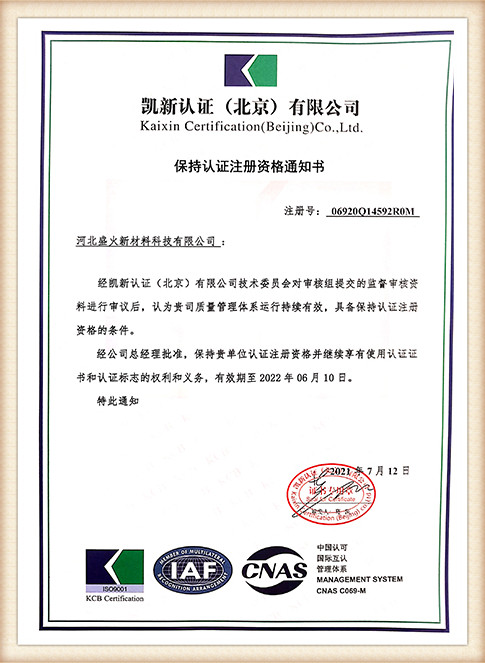The Resin Coated Sand Process An Overview
The resin coated sand process is a pivotal advancement in the field of foundry technology, primarily used to create high-quality molds and cores for precision metal casting. This innovative technique combines traditional sand casting methods with modern resin technologies to improve the mechanical properties and surface finishes of castings.
At its core, the resin coated sand process involves the application of a thermosetting resin to silica sand. The sand grains are coated with a resin binder, which enhances their cohesiveness and durability. The primary types of resins used include phenolic and furan resins, chosen for their excellent bonding properties and heat resistance. The correct formulation of resin and sand is crucial, as it significantly influences the integrity of the mold and the final cast product.
Once the sand is coated, the mixture is heated to cure the resin. This curing process essentially hardens the sand particles, allowing them to hold their shape more effectively during the casting process. This resulted in molds that exhibit superior strength, reduced permeability, and enhanced dimensional accuracy compared to traditional uncoated sand molds.
One of the key advantages of the resin coated sand process is its ability to produce complex shapes with intricate details. The sand, when combined with resin, can be easily shaped into the desired mold configurations, including undercuts and thin walls that are often challenging to achieve with conventional sand casting techniques. Furthermore, the high accuracy of the mold ensures that the castings produced are closer to the final specifications, reducing the need for extensive post-processing.
resin coated sand process

The resin coated sand process also offers improvements in the surface finish of the final products. The smoothness of the molds leads to finer surface details on the cast metal components, which is particularly essential in industries such as aerospace, automotive, and precision engineering, where surface quality is paramount. The reduction of surface imperfections not only enhances the aesthetic appeal of the cast products but also contributes to their overall performance.
In addition to these advantages, the resin coated sand process is more environmentally friendly than some other casting methods. The use of modern resins minimizes the release of harmful substances compared to traditional binders. Moreover, the ability to reuse the sand and the lower emissions during the casting process further emphasizes the sustainability aspect of this method.
However, the resin coated sand process is not without its challenges. The cost of resin and the need for precise control over the curing parameters can make the process more expensive compared to conventional sand casting. Additionally, operators must be well-trained to handle the materials and equipment properly to avoid issues during production.
In conclusion, the resin coated sand process represents a significant evolution in casting technology. With its ability to manufacture complex geometries, improve surface finishes, and enhance the mechanical properties of castings, it has become an essential method in modern foundries. As industries continue to demand higher precision and better quality in cast products, the resin coated sand process is likely to play an increasingly vital role in meeting these expectations.
Post time:Ott . 30, 2024 15:58
Next:sand preparation in foundry
